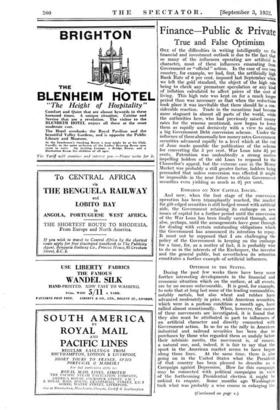Finance—Public & Private
True and False Optimism
ONE of the difficulties in writing intelligently on the financial and investment outlook is due to the fact that so many of the influences operating are artificial in character, most of these influences emanating from Government or " official" action. In the case of our own country, for example, we had, first, the artificially high Bank Rate of 6 per cent. imposed last September when we left the gold standard, the object of the high rate being to check any premature speculation or any kind of inflation calculated to affect prices of the cost of living. This high rate was kept on for a much longer period than was necessary so that when the reductions took place it was inevitable that there should be a con- siderable reaction. Trade in the meantime had become more stagnant in almost all parts of the world, while the authorities here, who had previously raised- money rates for the reasons mentioned, now began to lower them as rapidly and decisively with a view to aiding a big Government Debt conversion scheme. Under the influence of these abnormally low money rates Government securities advanced rapidly to a level, which at the end of June made possible the publication of the scheme for converting the 5 per cent. War Loan into 31 per cents. Patriotism was undoubtedly a strong motive impelling holders of the old Loan to respond to the Chancellor's appeal, but the extreme ease in the Money Market was probably a still greater- factor, holders being persuaded that unless conversion was effected it might be impossible in the near future to obtain Government securities even yielding as much as 34 per cent.






























 Previous page
Previous page